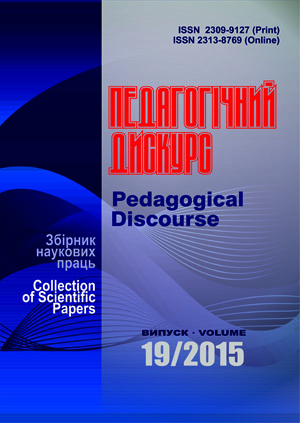The Problem of Forming Future Economistʼs Readiness to Foreign Language Professional Communication
Abstract
The article analyses the scientistsʼ approaches to understanding the essence of research key concepts. The main factors of readiness of the future economist to professional foreign language communication have been determined. They are the maturity of functional linguistic personality of the future economist; the maturity of professional abilities and skills of verbal and communicative behavior; the availability of professional and communicative skills, qualities, and knowledge of future specialists in economic sphere. The essences of the concepts «lingual personality of an economist» and «speech behavior of an economist» are grounded. The main factors that affect the mastering of certain algorithms of professional and communicative behavior are determined. It has been defined that the educational process at the economic university is specially organized. It is accompanied by constant reproduction of diverse professional communications. It has been supplemented the professiogram of future economist from the position of business communication. It has been concretized the specifics of economic activity, which involves mastering the communication skills for fulfillment of professional tasks. The main reasons for low level of readiness of the future expert to professionally-communicative activity are determined. The results of the scientific research that confirm the efficiency of the suggested technique are represented. Prospects for further research have been outlined. It exists the necessity to separate the criteria and indicators which can determine the level of readiness of the future economist for the professional foreign language communication.
Downloads
References
A. Ja. Psihologija: opisanija psihologicheskih testov, testirovanie on-lajn, treningi, uprazhnenija, statʼi, sovety psihologov [Psychology: descriptions of psychological tests, online test, training, exercises, articles, advices of psychologists]. Retrieved from: http://azps.ru/. [in Russian]
Batsevych F. S. Osnovy komunikatyvnoi linhvistyky [Fundamentals communicative linguistics]. Kyiv: Akademiia, 2004, 344 p. [in Ukrainian]
Bobneva M. I. Socialʼnye normy i reguljacija povedenija [Social norms and regulation of behavior]. Moscow: Nauka, 1978, 311 p. [in Russian]
Bogin G. I. Tipologija ponimanija teksta [Typology of understanding of the text]. Kalinin: KGU, 1986, 86 p. [in Russian]
Haponenko L. P. Imitatsiino-ihrovyi pidkhid u formuvanni hotovnosti studentiv do inshomovnoho spilkuvannia [Imitating-game approach in formation of studentsʼ readiness to foreign language communication]. Naukovyi visnyk Pivdennoukrainskoho derzhavnoho pedahohichnoho universytetu im. K. D. Ushynskoho, 2002, Vyp. 4-5, pp. 53–56. [in Ukrainian]
Dʼjachenko M. I., Kandybovich L. A. Psihologicheskie problemy gotovnosti k dejatelʼnosti [Psychological problems readiness for the activity]. Minsk : BGU, 1976, 173 p. [in Russian]
Zhinkin N. I. Rechʼ kak provodnik informacii [Speech as a conductor of information]. Moscow: Nauka, 1982,159 p. [in Russian]
Zubkov M. H. Suchasna ukrainska dilova mova [Modern Ukrainian business language]. Donetsk: SPD FO Serdiuk V. I., 2005, 448 p. [in Ukrainian]
Karaulov Ju. N. Russkij jazyk i jazykovaja lichnostʼ [Russian language and linguistic personality]. Moscow: Nauka, 1987, 263 p. [in Russian]
Kuljutkin Ju. N., Suhobskaja G. S. Modelirovanie pedagogicheskih situacij [Modelling of pedagogical situations]. Voprosy psihologii, 1984, № 5, pp. 41–44. [in Russian]
Lomov B. F. Kategorii dejatelʼnosti i obshhenija v psihologii [Categories of activity and communication in psychology]. Voprosy filosofii, 1979, № 8, pp. 34–47. [in Russian]
Ljubimova T. G. Jekonomicheskie interesy i mehanizm ih realizacii [Economic interests and the mechanism of their implementation]. Odessa: OPU, 1993, 156 p. [in Russian]
Maksymenko S. D., Pelekh O. M. Fakhivtsia potribno modeliuvaty (Naukovi osnovi hotovnosti vypusknyka pedvuzu do pedahohichnoi diialnosti) [It is necessary to model a specialist]. Ridna shkola, 1994, № 3/4, pp. 68-72. [in Ukrainian]
Suhih S. A., Zelenskaja V. V. Reprezentativnaja sushhnostʼ lichnosti [Representative nature of identity]. Filologicheskie nauki, 1992, № 1, pp. 86-93. [in Russian]
Poliakova H. A. Adaptyvne upravlinnia navchalnym protsesom v umovakh zahalnoosvitnoho kompleksu : avtoref. dys. … kand. ped. nauk [Adaptive management of educational process in conditions of general education complex] / H. A. Poliakova; Tsentr. in-t pisliadyplom. ped. osvity APN Ukrainy. Kyiv, 2003, 20 p. [in Ukrainian]
Ukrainska mova. Korotkyi tlumachnyi slovnyk linhvistychnykh terminiv [A short glossary of linguistic terms] / Za red. S. Ya. Yermolenko. Kyiv: Lybid, 2001, 224 p. [in Ukrainian]
Formanovskaja N. I. Rechevoe obshhenie: kommunikativno-pragmaticheskij podhod [Speech communication: communicative-pragmatic approach]. Moscow: Russkij jazyk, 2002, 216 p. [in Russian]
Формановская Н. И. Речевой этикет и культура общения / Н. И. Формановская. – М.: Высшая школа, 1989.– 159 с. / Formanovskaja N. I. Rechevoj jetiket i kulʼtura obshhenija [Speech etiquette and culture of communication]. Moscow: Vysshaja shkola, 1989, 159 p. [in Russian]
Yaroshchuk I. D. Pidhotovka maibutnikh ekonomistiv do profesiinoho spilkuvannia u protsesi vyvchennia humanitarnykh dystsyplin [Preparation of the future economists to professional communication in process of study of Humanitarian Disciplines] : dys. ... kand. ped. nauk : 13.00.04. Ternopil, 2010, 250 p. [in Ukrainian]

















